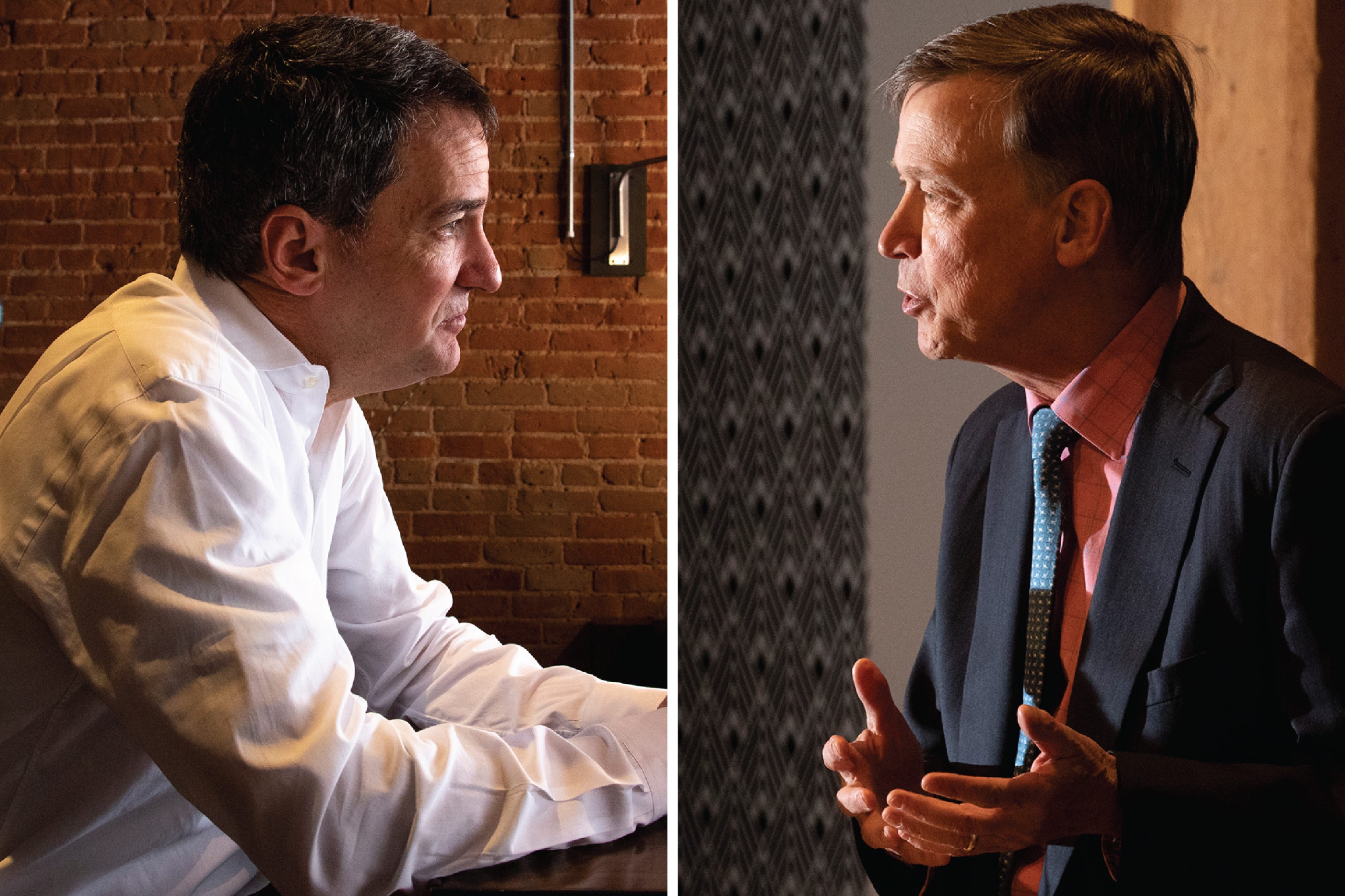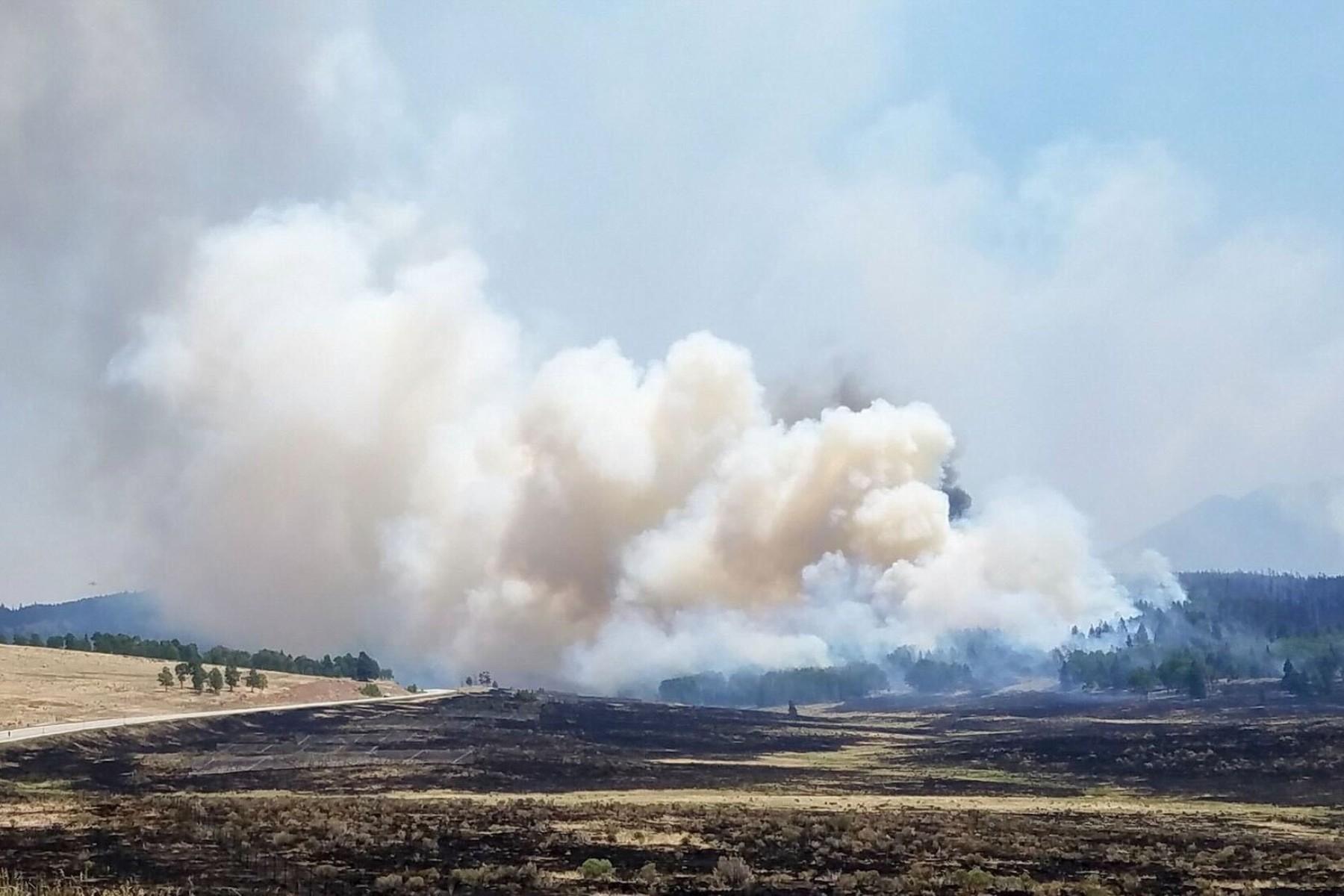
The two remaining candidates in Colorado’s U.S. Senate Democratic primary race discussed racial justice on Saturday in their second forum ahead of the June 30 primary. The event, organized by numerous groups including the Colorado Black Women for Political Action, the Colorado Immigrant Rights Coalition Action Fund , the Colorado Latino Forum, and Colorado Rising, ended with a real-time poll of the hundreds of people who listened in remotely.
The Colorado Racial Justice forum was planned months ago, but organizers said it was especially timely given the protests happening in Denver and throughout the country over the deaths of African-Americans after encounters with the police or white civilians, the latest, a Minneapolis man, George Floyd who died in police custody.
Former Democratic Gov. John Hickenlooper answered questions via Zoom and Facebook for the first hour, followed by former Statehouse Speaker Andrew Romanoff. Each man hopes to win the primary to challenge Republican Sen. Cory Gardner in November. The event highlighted philosophical and policy differences between the candidates.
1st Question
What have the men had done to combat systemic racism?
Hickenlooper said it all goes back to slavery. “Slavery is the nagging, persistent shame of our country. That for too long has denied the promise of America to too many of our citizens. That evolution to create two systems of justice. I mean, even after slavery, we went to Jim Crow and then forced servitude, institutionalized terrorism, which was what the lynchings were really all about.”
Hickenlooper referenced Paul Childs, a 15 -year -old developmentally disabled youth who was shot and killed by a Denver police officer in 2003 shortly after Hickenlooper was elected mayor of Denver. Childs was holding a knife and his family had called the police to their home for help. Hickenlooper said Childs’ death led to “some of the most comprehensive police reform.”
Hickenlooper was then asked to describe how he views the Black Lives Matter movement.
“Black lives matter means that every life matters and that the color of a person's skin has nothing to do with the richness of their lives and how important their place and their family and their neighborhood and their community [is],” Hickenlooper said. “That every life is sacred and every life deserves the protections of our system of public safety and our system of justice. People should not be fearful of the people that have been entrusted to protect them.”
Several viewers objected to Hickenlooper’s definition. “‘Black Lives Matter means everybody's life matters.’ Nope,” wrote Jack Flotte, on the comments section of the Facebook livestream.
Rhonda Dern called Hickenlooper’s "all lives matter" definition a slam. “‘Black lives matter’ is about the love of self and African-American rights to equal justice and fairness. I am shocked he doesn't understand this.”
Romanoff approached the question differently.
“To me what ‘black lives matter’ means is that this country, even before its founding, has engaged in the systemic oppression of African-Americans brought here in chains, subjected to the crime of slavery, abused ever since, lynched, murdered in every way, we have chosen as a nation to deny the essential humanity of our African-American brothers and sisters,” Romanoff said. “And so when we say ‘black lives matter,’ it is not the same as saying ‘white lives matter.’ ‘All lives matter.’ It is instead to recognize the racism that is baked into our nation from its founding documents.”
Romanoff also talked about his time working at the Southern Poverty Law Center where he worked to help stop white supremacy. “And in some ways it was easier to see racism in that form because it wore a hood and burned a cross on your lawn.”
The candidates fielded a handful of questions on income inequality and housing, and ways they could help bolster minority-owned small businesses. The forum ended with a lightning round of yes or no questions. “I don't function that way. The world doesn’t function that way,” Hickenlooper quipped as he told the moderators he would keep his answers to 10 seconds instead of answering yes or no.
“There's nowhere in life where you have to, or at least there's nowhere in government where you have to just do it, yes or no. Everything is a function of modifying,” he said before the moderators cut him off and asked him to try.
Romanoff did not object to the lightning round format.
“When you are in a legislative position, you actually have to vote yes or no. It might not always be the best choice you make and you need to learn from your mistakes as I've done,” Romanoff said. His campaign later said he was referring to a law he helped pass in 2006 when he was the speaker of the statehouse and Republican Bill Owens was governor. It required law enforcement agencies to report to federal authorities when they arrested people believed to be undocumented. Immigrants rights groups have criticized that decision and Romanoff has since called it a mistake that led to unintended consequences.
Lightning round questions
Paid family and medical leave will be on the ballot this November. Will you publicly endorse the campaign for this ballot measure?
- Hickenlooper: I haven't seen it, but most likely, yes.
- Romanoff : Yes.
Do you support the private prison industry profiting off the detention and incarceration of our communities?
- Hickenlooper: No. I don’t
- Romanoff : No.
Do you support overturning the Hyde Amendment on the use of federal funds to pay for abortion services?
- Hickenlooper: The Hyde amendment was a bad idea from the beginning. It should be repealed.
- Romanoff : Yes.
Do you support the future COVID relief legislation that directs ICE to release immigrants from detention that do not pose a threat to public safety and national security? And given the challenges behind accessing legal counsel at this time halt all deportations?
- Hickenlooper: Yes. I think you can’t do it safely, so you can't do it.
- Romanoff : Yes.
Do you support a ban on hydraulic fracking in Colorado?
- Hickenlooper: I support getting Colorado to a totally clean energy economy as rapidly as humanly possible.
- Romanoff : Yes.
Do you support increasing taxes on corporations and the wealthiest Coloradans?
- Hickenlooper: I definitely support more resources, more revenues coming in and they’re going to come from a variety of different places and there will certainly, I guess… Sure. Yes. Everybody should pay more. We're taking on the largest debt since World War II.
- Romanoff : Yes.
You support abolishing ICE?
- Hickenlooper: I support reforming ICE
- Romanoff : Yes.
Do you support single payer universal health care?
- Hickenlooper: I support universal coverage and a public option that will ultimately lower costs.
- Romanoff : Yes.
Will you support legislation like the 2009 Employee Free Choice Act, geared at allowing workers to organize unions outside of intimidating anti-union campaigns?
- Hickenlooper: I think workers should always have the right to organize.
- Romanoff : Yes.
Do you support moving the federal minimum wage to at least $15 an hour?
- Hickenlooper: I think $15 an hour will be, Yes. Fifteen dollars an hour.
- Romanoff : Yes.
People took an online poll immediately after the event. The initial numbers showed that if the election were held today, 308 would vote for Romanoff, 15 for Hickenlooper and 15 were undecided.
After serving two terms as mayor and two terms as governor, Hickenlooper is well known in the state, and was recruited by national Democrats to get into what was once a crowded primary field. In recent weeks he’s been endorsed by high profile African-American groups, politicians and community leaders including Denver Mayor Michael Hancock and the Denver Ministerial Alliance.
Romanoff has strong grassroots support and overwhelmingly won at the state assembly. He’s been endorsed by former Senate President Peter Groff, and Vita Brown, a community activist in Aurora. Their first debate is scheduled for June 10 and will air on CBS 4. It will last one hour. The campaigns say other forums and debates are still being negotiated.
The other organizations that were involved in hosting the racial justice forum are COLOR Action Fund, Colorado People's Action, Padres & Jovenes Unidos Action, SEIU Local 105, United for a New Economy Action, and Colorado Working Families Party.









